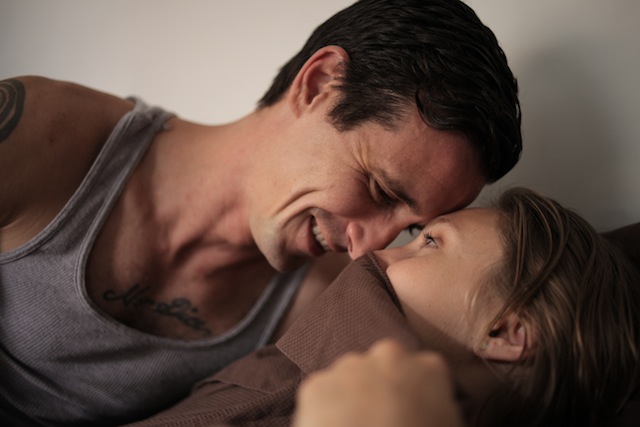 Back to selection
Back to selection
Five Questions with Bloomin Mud Shuffle Director Frank V. Ross
 Bloomin Mud Shuffle
Bloomin Mud Shuffle For my money, Frank V. Ross is one of the most inventive, witty and honest low-budget filmmakers that major festival land has neglected to embrace. With the exception of the SXSW-premiering Audrey the Trainwreck, Ross’s films have toured the regional circuit like best kept secrets, with their structurally complex, yet casually rendered studies of modern relationships serving as any program’s unmitigated highpoint.
His latest, Bloomin Mud Shuffle, which premieres tonight at the Wisconsin Film Festival, concerns Lonnie (James Ransone), a vaguely alcoholic house painter, and the object of his unsteady affection, Monica (Alexia Rasmussen). Such a distilled synopsis scarcely does justice to Ross’s execution, with its open-facing as ever dialogue and scattered timeline that buttresses this two-handed character study into something all its own.
Filmmaker: Bloomin Mud Shuffle literally shuffles the quotidian routines of Lonnie’s days into a sort of chronological haze — there are no markers as to what’s taking place when, and what, i.e. the opening, may have already happened. Once you have an idea for a film, how do you go about shaping its structure?
Frank V. Ross: I don’t follow a recipe or anything. The structure of the script was even more out of order. I wanted to make a film about a couple not becoming a couple, but not to be able to blame it on anything. So I thought through scattering the instances and interactions, we’d be able to focus on the two people as pieces that didn’t fit, rather than two who screwed up, when and why. It read much better than it played, so Joe [Swanberg]had the idea to put the complete film back in chronological order and restructure from there. From that the circular — I call it a circular — structure was found and cut to play as well as it read. For me, it was like spinning around and around then about an hour in you’re seeing clearly again. Then it’s over.
Filmmaker: In a way, we get to know Lonnie and Monica through their interactions with their families before we understand their relationship to one another. What appealed to you about presenting them in a reverse engineered circumstance, relative to more ‘traditional’ narratives?
Ross: Traditional narrative is boring, or I’m not good at it — one or the other, I haven’t figured that out. Work, family, friends: that’s all these characters have. We need to know these two pieces that don’t fit individually through these things before they clank and fall apart.
Filmmaker: You don’t seem to take much interest in context or your characters’ backstories — I more see your films more as hinging upon astute, of the moment exchanges. Is there a lot about your characters that you leave off the page? How do you build your dialogue, and what is the actors’ involvement in that?
Ross: When you’re not told everything as a viewer, your imagination gets running. So that’s the world around the frame, or off screen, and I love that. I keep the characters’ personalities in my head, and don’t have any interest in making them likeable, that’s how the dialogue comes out. Keep the color of the person in your head and don’t type anything that clashes. The actors read and comprehend in a human way. Then they act it. It’s how you get things like “cunty face” or breath smelling like “an abortion.” I didn’t write those things, but they felt right to Alexia and James in the context of the character.
Filmmaker: Can you speak a bit about your collaboration with John Medeski, and how that came about? Your films tend to be very contemporary romances, but the score provides a nice, anachronistic slant.
Ross: This is the third film of mine that John has scored and the first time he admitted that he likes the movies more without his music. I disagree, of course. It started with me asking him via e-mail via his manager. I underestimated his busy schedule and he wasn’t able to score that film (Present Company), but he watched and enjoyed it, so when the next film (Audrey the Trainwreck) was ready, boom.
As far as an “anachronistic slant,” I’m a gonna go with “timeless.” I like jazz. I like a single instrument to score my movies and a piano’s got all the notes. I guess I also don’t want to use music to help identify the movie, and John isn’t interested in scoring for “tone,” so we get along.
Filmmaker: Your films bare whimsical titles that relate either tangentially or very distantly to the story itself. Where did Bloomin Mud Shuffle come from?
Ross: For me the titles relate very directly. It’s a reflection of how I think of the movies, I guess. For this one? Mainly, it was common replies to: “How’s it goin’?” “Bloomin mud shuffle” is my version of like; “Same shit different day,” or “Livin’ the dream,” “Nother day in paradise,” “Can’t complain.”
After seeing the finished film, I think it means maintaining your own misery. Lonnie is doing the bloomin mud shuffle, carefully protecting his unhappiness. Monica is doing the bloomin mud shuffle by never being very straight forward with him. Kahlil Gibran may have been in my head too with, “love that blooms like a flower knows it’s season” blooms. And it also goes back to your first question and the “chronological haze” structure. Literally shuffle. Or if you ask James, it’s the way you walk when you have diarrhea.
